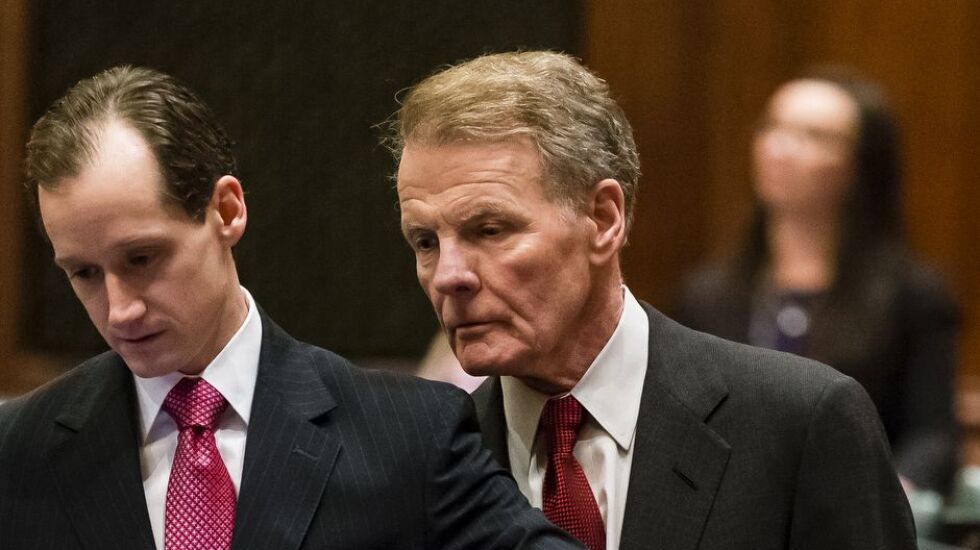
Jurors in the ComEd bribery trial on Thursday heard the rare testimony of a former top staffer to onetime Illinois House Speaker Michael Madigan — who like his boss was often seen but not heard in public as crucial decisions were made in Springfield.
Will Cousineau took the witness stand after securing letters from the feds granting him immunity and making clear he’s not a target of an investigation.
Then he listened as prosecutors played a December 2018 call he’d participated in and which was secretly recorded by the FBI. Madigan could be heard in one of his so-called “Sunday morning” meetings seeking strategic advice about who should serve on his upcoming leadership team in the Illinois General Assembly.
It showed that Madigan not only included his longtime friend and confidant, Michael McClain, in high-level decisions affecting Illinois House Democrats — but he actively sought McClain’s advice even after McClain retired as a ComEd lobbyist in 2016.
Cousineau had served as Madigan’s issues director and political director of the Democratic Party of Illinois before becoming a lobbyist himself by the time of the call.
“I understand we have a lot of people walking around trying to find things to complain about,” Madigan is heard saying in the Dec. 9, 2018 chat with his inner circle, which also included his chief of staff, general counsel and issues director.
Only McClain pipes up to offer Madigan advice. He suggested the speaker develop committees with strong chairs who could withstand political attacks.
“You don’t have to kill a bill or, or an amendment in Rules,” McClain said. The reference was to the House Rules Committee — where bills often died if they weren’t assigned out.
Rather, McClain said, Madigan could find committee chairs “strong enough” to put bills in a “working subcommittee” — where they would apparently die instead.
The elusive Cousineau, who spoke softly and was often told to raise his voice, took his star turn in the trial of McClain and three other former political power players: Former ComEd CEO Anne Pramaggiore, ex-ComEd lobbyist John Hooker, and onetime City Club President Jay Doherty.
The four are accused of trying to bribe Madigan by landing his associates money, jobs and contracts in order to sway the once-powerful speaker while legislation crucial to ComEd moved through the statehouse.
Critical to the case is whether McClain acted as an agent of Madigan and passed along his demands. Also key is Madigan’s ability to kill — or rescue — legislation in the House in a variety of ways.
As they did with other witnesses Wednesday, defense attorneys sought to paint Cousineau’s testimony as a window into real-life politics, lobbying and friendships.
Through Cousineau, prosecutors showed that McClain not only played a prominent role in the late 2018 discussion about upcoming House leadership. He also participated in an internal working group as stakeholders pushed a key bill at issue in the trial: The Future Energy Jobs Act, or FEJA, which passed in 2016.
Jurors learned that Cousineau shared with McClain the names of lawmakers not expected to be present when FEJA headed for a vote. And they learned that Madigan dispatched Cousineau to rescue the bill after Cousineau realized it didn’t have enough votes to pass.
Prosecutors also revealed through Cousineau that former Madigan staffer Shaw Decremer made payments to two Madigan allies: former Cook County Recorder of Deeds Edward Moody and former state Rep. Edward “Eddie” Acevedo, after Decremer became a lobbyist.
Decremer texted pictures of checks written to Moody and Acevedo in March 2017, according to evidence in the trial. The memo of each check read, “March 2017 payroll.”
Moody and Acevedo are among the Madigan associates that the former ComEd officials allegedly arranged payments for, through intermediaries, as part of the scheme to influence Madigan. The Madigan associates allegedly did little or no work.
Decremer has not been charged with wrongdoing. Prosecutors say Moody has not been charged in exchange for his anticipated testimony in the trial. Acevedo served a six-month prison sentence for a separate tax evasion conviction.
In another text, Decremer allegedly sent a photo of a ComEd check worth $14,250 to Cousineau, who was considering a move into the private sector at the time.
“That’s going to be what you make in a week!!” Decremer allegedly wrote in a message to Cousineau.
Cousineau replied, “I wish!!!!!!!! As long as I don’t have a inch of employees to pay out of my check, I’ll be OK.”
On the stand, Cousineau said “he knew that Mr. Decremer was paying these folks out of his check,” but didn’t know why Decremer had sent him the text.
Finally, jurors heard an April 2018 call between McClain and Cousineau in which McClain asked Cousineau how he liked the “dark side” — lobbying.
Cousineau agreed that it’s “easy to keep your priorities straight if you remember that.”
At another point in his questioning by Assistant U.S. Attorney Diane MacArthur, Cousineau acknowledged McClain had a “magic list” of people who had been helpful to the speaker and were available to work as lobbyists. He said it was a handwritten note from the Talbott Hotel.
But under questioning by defense attorney Patrick Cotter, Cousineau said it was not “abnormal” to keep track of people who were helpful.
“The magic list is just normal politics with a name Mike put on it, right?” Cotter asked.
Cousineau agreed.
Finally, near the end of Cousineau’s testimony, Hooker attorney Michael Monico confronted Cousineau about his non-target and immunity letters from federal prosecutors. Monico pointed out that Cousineau didn’t say “anything that would get you in trouble with the government.”
Cousineau said his lawyers asked for the non-target letter.
But he agreed with Monico that “it would not be a good thing for someone to be a target” of the feds’ investigation.
Contributing: Dave McKinney







